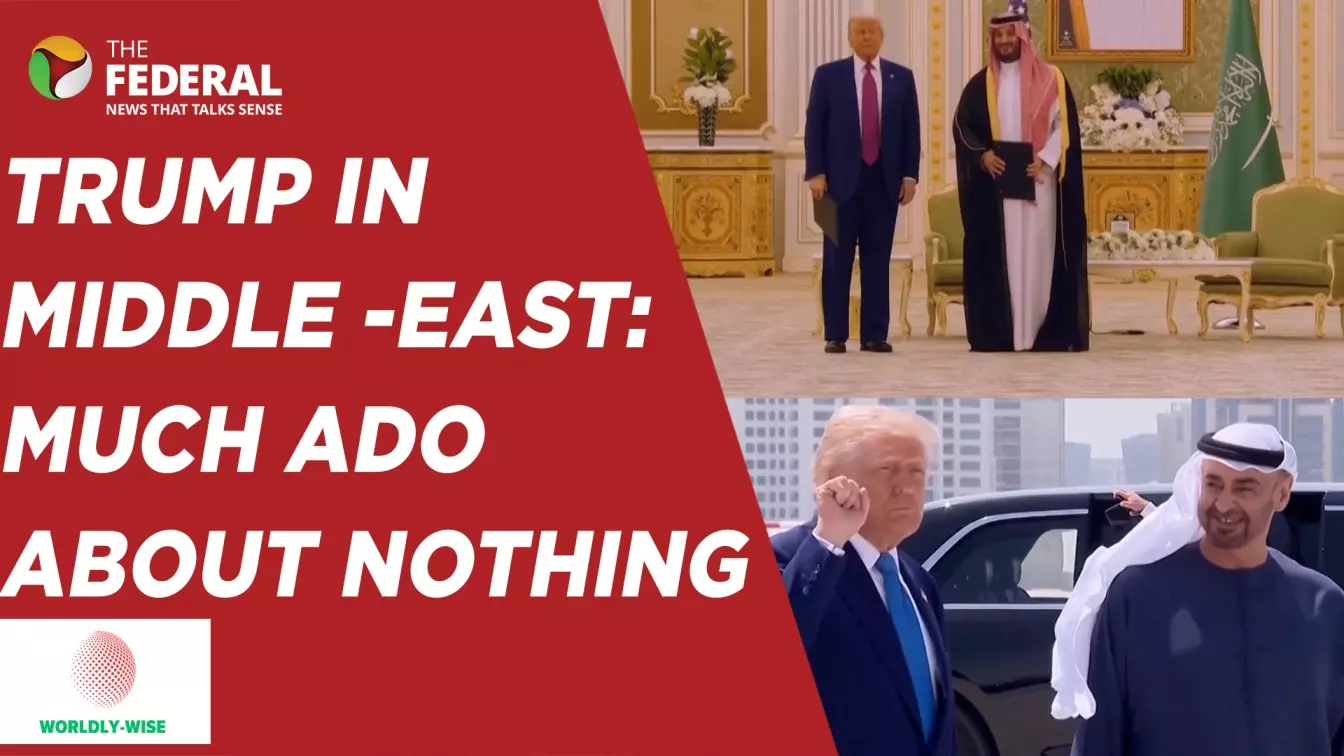
In this Worldly-Wise episode, KS Dakshina Murthy unpacks Trump’s high-stakes visit, the optics behind his bold decisions, and why the region’s deeper issues remain unresolved.
Trump’s Middle East visit: Investment, diplomacy, or just drama?
Trump’s visit to the Middle-East triggers investments, controversy and hype. But did he really shake up the region? The Federal's Consulting Editor KS Dakshina Murthy does a reality check

In a dramatic return to West Asia, US President Donald Trump made global headlines with his unconventional diplomatic moves. From brokering billion-dollar investments to snubbing Israel, Trump’s May 13–16 trip was positioned by his supporters as a game-changer in the region. But was it truly transformative - or just Trump being Trump?
In this Worldly-Wise episode, KS Dakshina Murthy unpacks Trump’s high-stakes visit, the optics behind his bold decisions, and why the region’s deeper issues remain unresolved.
Investment promises
Trump secured multi-billion-dollar investment commitments from Saudi Arabia, UAE, and Qatar, with estimates running up to $4 trillion. Saudi Arabia alone pledged $600 billion. Additionally, Trump approved the sale of $145 billion worth of weapons to the Saudis - marking the largest arms deal between two countries in history.
Also Read: Trump administration bars Harvard from enrolling foreign students
He also lifted a 45-year-old US sanctions regime on Syria and met with President Ahmed al-Sharaa, who had once been affiliated with Al-Qaeda. This shocked observers, especially as the HTS, led by al-Shara, was previously labelled a terror group by the US.
Unusual omissions
Most strikingly, Trump did not visit Israel - a sharp break from past US presidential visits to the region. Analysts speculated this as a cooling in relations with Prime Minister Benjamin Netanyahu, though Murthy called it “a storm in a teacup.”
“The relationship between the US and Israel is organic, deep, and time-tested,” said Murthy. “Disagreements between two leaders don’t shift that foundation.”
Also Read: It's Donald Trump VS Ramaphosa over ‘white genocide’ claims
Still, the omission was seen as a symbolic tilt, especially amid Israel’s ongoing assault on Gaza, which has already claimed an estimated 55,000 Palestinian lives.
Abraham Accords and Gaza
Trump pushed for Saudi Arabia to join the Abraham Accords, a move that would normalise ties with Israel. But he tempered his push, saying the Saudis could proceed “at their convenience".
Murthy explained the unlikelihood of such a move while the Gaza conflict rages, “Unless Crown Prince Mohammed bin Salman is willing to commit political harakiri, Saudi-Israeli ties remain a distant possibility.”
Also Read: PM Modi has never rejected Trump's India-Pak mediation claims: Congress
Trump’s past vision of Gaza as a Mediterranean-style “Riviera” was rebranded this time as a “Freedom Zone". Netanyahu hasn’t labelled it, but his intentions, said Murthy, are clear - “Clear Gaza of Palestinians".
Syria’s realignment
Much noise was made about Trump’s meeting with Syria’s Ahmed al-Sharaa, but Murthy reminded viewers that this was expected.
“The US, Israel, and Turkey quietly enabled the ouster of Bashar al-Assad by the HTS. This meeting just made it official,” he said.
Also Read: What is Golden Dome, Donald Trump's new-age missile defence shield?
Al-Sharaa, once tied to Al-Qaeda, broke away in 2016. His group HTS replaced Assad, an enemy of Israel, with a new regime the US seems open to engaging with.
Talks with Iran
Trump’s announcement of opening dialogue with Iran over its nuclear programme raised eyebrows. Especially since he was the one who unilaterally pulled out of the 2015 Iran nuclear deal and reinstated sanctions.
“Trump’s invitation looks more like a diktat than a genuine olive branch,” Murthy said, adding that Ayatollah Ali Khamenei has publicly dismissed the sincerity of these overtures.
Also Read: Trump calls back Apple to US; will India be caught in the crossfire?
Talks through Oman as intermediary have started, but Tehran remains skeptical, demanding more than symbolic gestures.
The real impact
Trump may have succeeded in putting the spotlight on himself, but how much has changed? His real victories seem to be commercial: luring investments and scoring a $400 million aircraft gift from Qatar.
“For Trump to be called a peacemaker or statesman, he has to actually make a difference,” Murthy concluded.
Also Read: Trumped out, outdone India trying to find a place in new world order
And while Trump continues to make tall promises - including ending the Ukraine war “in a single day” - the world is still waiting.
(The content above has been generated using a fine-tuned AI model. To ensure accuracy, quality, and editorial integrity, we employ a Human-In-The-Loop (HITL) process. While AI assists in creating the initial draft, our experienced editorial team carefully reviews, edits, and refines the content before publication. At The Federal, we combine the efficiency of AI with the expertise of human editors to deliver reliable and insightful journalism.)

